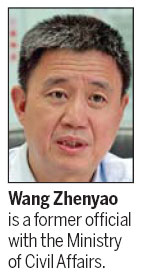Charities 'must boost transparency'
Updated: 2012-02-06 09:13
By He Dan (China Daily)
|
|||||||||||

Scandals have taken toll on public trust, former watchdog head says
BEIJING - Government-backed charity groups must improve transparency or risk losing donors and public trust, an ex-watchdog official said.
Wang Zhenyao, the former head of the department of social welfare and charities under the Ministry of Civil Affairs, also called for a loosening in the requirement for organizations to be registered as public charity foundations. Only public foundations that are affiliated to the government are allowed to raise funds from the public.
A series of scandals triggered a public outcry over government-backed charity groups last year.
"This dented the image of China's public charity groups," said the former official at the top watchdog on charity organizations.
"If they cannot do the basics, such as informing donors where money goes, they will lose donors," said Wang, now the dean of the One Foundation Philanthropy Research Institute under the Beijing Normal University.
The scandals Wang was referring to included a credibility crisis hitting the Red Cross Society of China. The society was accused of abusing donations after Guo Meimei, 20, who claimed to be a general manager of a commercial organization under the society, showed off her luxury handbags and cars on her micro blog in June.
In a report released late last year the society denied any connection with Guo but admitted its supervision of subordinate agencies could be improved.
The episode "eroded public trust in charity as a whole", Wang said. Donations to the society fell to about 385 million yuan ($61 million) in 2011 from 3.01 billion yuan in 2010.
Public charities should stop relying on administrative orders to raise funds, Wang said, in what he described as a legacy of the planned economy.
He was referring to a case exposed by the media in September. The bureau of civil affairs in Changsha county in Central China's Hunan province demanded that teachers donate 400 yuan annually to help eradicate poverty. The money was deducted from teachers' bank accounts without their permission and given to a local branch of the China Charity Federation.
Charities could find it even more challenging to raise funds from the public if foundations don't change their ways of doing charity.
Micro blogs have helped the public get information from multiple channels and better supervise charity foundations, Wang said. The popularity of the Internet also enables people to donate to charity organizations that operate transparently.
For example, Wang said, the Free Lunch for Children, a project initiated by journalists to improve the diet of rural students, attracted a number of donors last year and raised more than 16 million yuan in the five months since its April launch.
Wang said one way to improve the charity sector is to usher in competition.
The government should loosen registration requirements for charities, he said, adding that more players in the field will help those that have worthwhile projects and can provide professional services for the needy.
"China has too few public charity organizations and that bottlenecked the growth of the sector," Wang said.
Statistics from the Beijing-based China Foundation Center, a non-governmental information provider, show that China has about 2,000 charity foundations. However, the United States has more than 100,000, Wang said.
Minister of Civil Affairs Li Liguo encouraged civil affairs authorities in December to end the practice of requiring organizations to be affiliated to a government agency before they can be registered as a charity allowed to raise public funds.
Related Stories
Foundation defends donation distribution 2011-09-07 17:48
Getting a charity venture started 2011-05-04 08:01
Charity in search of elusive glasnost 2011-07-05 07:53
Historical charity site found in C China 2011-07-18 19:28
- Sales of holiday snack spike across mainland
- German firms seeking growth in China
- China bans airlines into EU carbon scheme
- Rate of rise in Web use falls
- Executives detained in financing probe
- Charities 'must boost transparency'
- China alters controversial Poyang dam plan
- China's electricity supplies to remain tight this year








